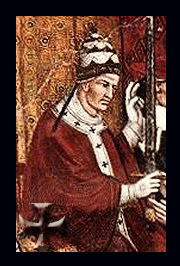Pope Alexander III
Appearance

Pope Alexander III (born Roland of Siena; c. 1100/1105 – 3 August 1181) was head of the Catholic Church and ruler of the Papal States from 7 September 1159 until his death. A native of Siena, Alexander became pope after a contested election, but had to spend much of his pontificate outside Rome while several rivals, supported by Holy Roman Emperor Frederick I Barbarossa, claimed the papacy. Alexander rejected Byzantine Emperor Manuel I Komnenos' offer to end the East–West Schism, sanctioned the Northern Crusades, and held the Third Council of the Lateran.
Quotes
[edit]- We are deeply distressed and greatly worried when we hear that the savage Estonians and other pagans in those parts rise and fight God's faithful and those who labour for the Christian faith and fight the virtue of the Christian name. ... to gird yourselves, armed with celestial weapons and the strength of Apostolic exhortations, to defend the truth of the Christian faith bravely and to expand the Christian faith forcefully.
- Non parum animus noster (11 September 1171 or 1172), quoted in Iben Fonnesberg-Schmidt, The Popes and the Baltic Crusades: 1147-1254 (Brill, 2007), p. 59
- Trusting God's mercy and merits of the apostles Peter and Paul, we thus concede to those forcefully and magnanimously fighting these often mentioned pagans one year's remission of sins for which they have made confession and received a penance as we are accustomed to grant those who go to the Lord's Sepulchre. To those who die in this fight we grant remission of all their sins, if they have received a penance.
- Non parum animus noster (11 September 1171 or 1172), quoted in Iben Fonnesberg-Schmidt, The Popes and the Baltic Crusades: 1147-1254 (Brill, 2007), p. 59
Quotes about
[edit]- In the post-Roman West personal diplomacy was more normal, for instance when family members were vying to divide up a kingdom, as portrayed dramatically in the opening scene of Shakespeare’s King Lear. A notable example was the series of summits in Carolingian France after the death of Louis the Pious, particularly those at Verdun in 843 and Meersen in 870.The outlines of these territorial settlements were laboriously thrashed out months in advance by commissioners who surveyed the terrain and gathered toward the summit data. But plenty of scope still remained for face-to-face haggling by the principals—their in-person meetings guaranteed the agreements by an exchange of oaths and sometimes of hostages. On other occasions, summits concluded carefully prepared peace agreements, as when Frederick Barbarossa and Pope Alexander III met in Venice in 1177.This conference took place on neutral territory; others, as with late Roman practice, were conducted in the borderlands. In either case, the location was chosen to ensure the status and/or security of each ruler.
- David Reynolds, Summits: Six Meetings that Changed the Twentieth Century (2007),

